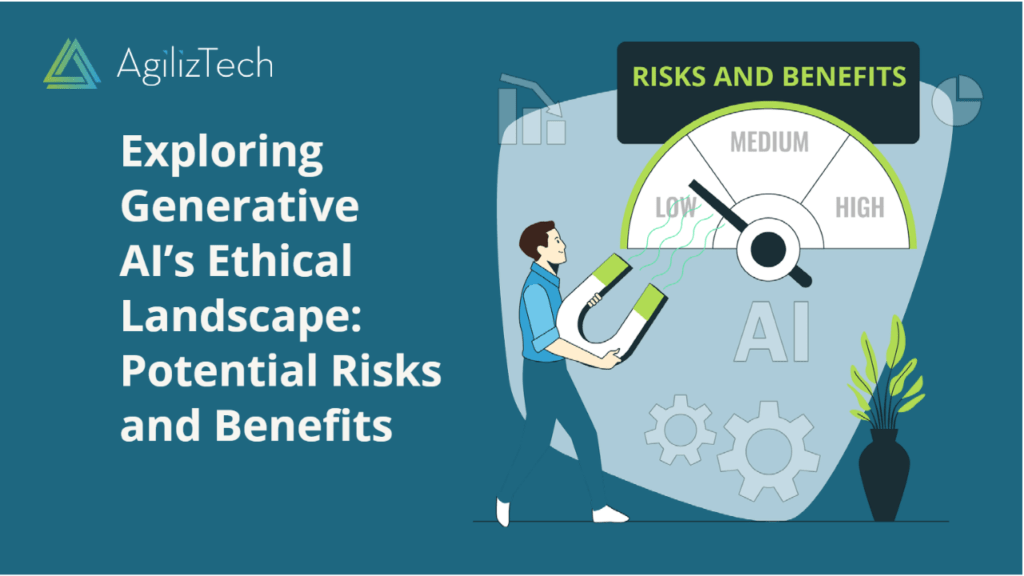
Ethics of Generative AI: Detailed Exploration
Ethics of Generative AI: Examining the Potential Risks and Benefits
Ethics of Generative AI: Overview
Generative AI is a branch of artificial intelligence that focuses on creating new content based on existing data, such as text, images, music, or code. Generative AI has many applications and benefits, such as enhancing creativity, improving productivity, and generating novel solutions. However, generative AI also poses some ethical challenges and risks, such as potential misuse, impacts on jobs, and quality and reliability issues. In this blog post, we will explore some ethical considerations when using generative AI and provide a balanced view on the potential risks and benefits.
Ethics of Generative AI: Potential Misuse
One of the main ethical concerns about generative AI is the potential for misuse and abuse. Generative AI can be used to create fake or misleading content, such as deepfakes, fake news, or spam. This can negatively affect individuals and society, such as violating privacy, spreading misinformation, or influencing opinions and behaviors. For example, deepfakes are realistic videos or images that manipulate the appearance or voice of a person, such as a celebrity or a politician. Deepfakes can be used for entertainment or satire, but they can also be used for malicious purposes, such as blackmailing, defaming, or impersonating someone.
To prevent or mitigate the potential misuse of generative AI, some possible solutions include:
- Developing ethical guidelines and standards for generative AI developers and users.
- Implementing verification and authentication mechanisms to detect and flag fake or misleading content.
- Educating and raising awareness among the public and the media about the capabilities and limitations of generative AI.
- Promoting responsible and transparent use of generative AI for positive and beneficial purposes.
Impacts on Jobs
Another ethical issue related to generative AI is its impact on jobs and employment. Generative AI can automate or augment various tasks and processes that require human creativity or intelligence, such as writing, designing, composing, or coding. This can have positive effects, such as increasing efficiency, quality, and innovation. However, this can also have adverse effects, such as displacing workers, reducing human agency, or creating skill gaps.
To address or balance the impacts of generative AI on jobs and employment, some possible solutions include:
- Creating new jobs and opportunities that leverage human skills and abilities that complement generative AI.
- Providing training and education for workers to adapt to the changing demands and requirements of the labor market.
- Ensuring fair and equitable access to generative AI tools and resources for workers and employers.
- Protecting the rights and interests of workers and employers concerning generative AI.
Quality and Reliability
A third ethical aspect of generative AI is the quality and reliability of the generated content. Generative AI can produce high-quality, realistic content that matches or surpasses human performance. However, generative AI can also produce low-quality or unrealistic content containing errors, biases, or inconsistencies. This can affect the generated content’s validity, credibility, and usefulness. For example, generative text can contain grammatical mistakes, factual inaccuracies, or logical fallacies. Generative images can contain artifacts, distortions, or anomalies.
To ensure or improve the quality and reliability of generative AI content, some possible solutions include:
- Developing evaluation and feedback mechanisms to assess and improve the performance and accuracy of generative AI models.
- Incorporating human oversight and intervention to review and edit the generated content.
- Applying ethical principles and values to guide the design and development of generative AI models.
- Acknowledging the limitations and uncertainties of generative AI content.
Ethics of Generative AI: Conclusion
Generative AI is a powerful and promising technology that can create new content based on existing data. Generative AI has many benefits and applications for individuals and society. However, generative AI also raises some ethical questions and challenges that need to be addressed. By considering the potential risks and benefits of generative AI from a balanced perspective, we can use generative AI responsibly and ethically.



